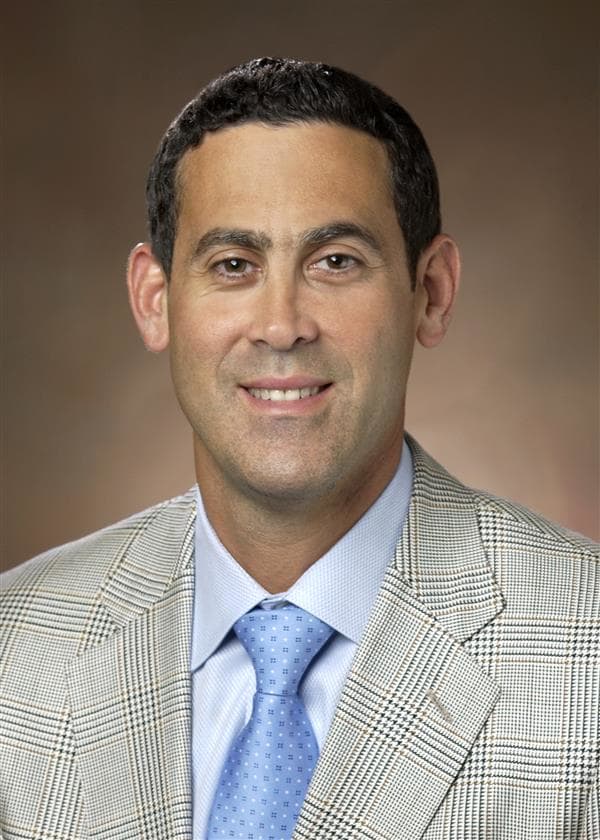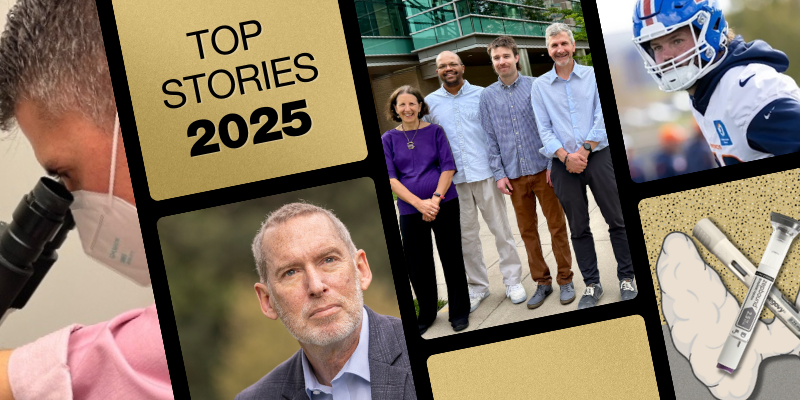AstraZeneca is pharmaceutical company committed to developing novel anti-cancer drugs. The University of Colorado Cancer Center is one of the fastest-growing academic cancer research centers in the United States, with hundreds of scientists and doctors working to better understand the disease. Recently, CU Cancer Center leaders visited the AstraZeneca Research and Development Campus in Gaithersburg, Maryland to discuss how a handshake between CU’s academia and AZ’s industry could help both take steps toward the ultimate goal: speeding the delivery of new drugs to cancer patients who need them.
“This was an opportunity to give AstraZeneca a sense of where we’re headed from a research standpoint, and to highlight the tremendous opportunities for collaborations on this campus,” says David Raben, MD, CU Cancer Center investigator and professor in the CU School of Medicine Department of Radiation Oncology.
Joining Raben were Karyn Goodman, MD, CU Cancer Center associate director for Clinical Research, and Wells Messersmith, MD, CU Cancer Center associate director for Translational Research. Among other possible collaborations, Goodman and Messersmith presented their visions for working together to address unmet needs in gastrointestinal cancers including pancreas and esophageal tumors.
“The goal is to find strategic areas to partner with companies like AstraZeneca both in the pre-clinical and clinical settings, with seamless clinical trial development and activation across our campuses,” Raben says, pointing out that clinical trial design is changing dramatically as the new, targeted therapies are tested against a cancer’s activating mutations, irrespective of where a cancer lives in the body. “We hope that AstraZeneca can be a partner in basket or umbrella trials, rapidly testing their novel drugs and immunotherapy agents across disease sites, in combinations with existing treatments like chemotherapy and radiation to move forward in larger trials.”
Leaders from the CU Cancer Center lung cancer program including Paul Bunn, Jr., MD, Ross Camidge, MD, PhD, and Robert Doebele, MD, PhD, joined via teleconference to discuss collaborations specifically focused on lung cancer.
The evolution of the CU/AZ partnership continues to keep it at the cutting edge. For example, the recently completed PACIFIC trial, funded by AstraZeneca, showed that the company’s immunotherapy drug, durvalumab, extended the lives of stage III non-small cell lung cancer patients after the use of chemoradiation, which Raben calls, “the most significant advance in the standard of care for stage III lung cancer in over two decades.” Now, Dr. Camidge continues as the principal investigator at CU for the AZ-sponsored COAST trial, testing newer drugs in combination with durvalumab after chemo-radiation for Stage III non-small cell lung cancer.
However, academic medical centers enrolling patients in industry clinical trials isn’t the only model of collaboration. For example, CU Cancer Center hosts one of the country’s only phase I drug development programs built around radiation oncology.
“Rather than trying to make radiation itself work better, we are beginning to change our way of thinking about radiation, using radiation in an effort to make drugs to work better. We’re learning to use radiation not as the fire, but as the fire starter,” Raben says. “Our goal is to discover how radiation and other techniques can create the right environment for these drugs to work even better within a cancer and within the surrounding tumor microenvironment.”
In this model, basic research from CU Cancer Center investigators has shown that in addition to directly killing tumor tissue, radiation may sensitize the body’s immune system to target cancer. But doctors need the right immunotherapy drugs to take advantage of this sensitized landscape.
“We hope that our partnership with AstraZeneca will bring to the University of Colorado a pipeline of exciting new drugs along with critical research funding that we need in order to do the basic, preclinical work needed to explore these drugs’ potential,” Raben says.
Industry partnership will also help CU Cancer Center researchers stay at the cutting edge of evolving fields like the targeting of DNA-repair mechanisms. Basically, many chemotherapies damage cancer cell DNA, and a new class of drugs seeks to magnify the effect of these chemotherapies by keeping cancer cells from repairing this damage.
“AZ has a tremendous pipeline of DNA damage repair inhibitors,” Raben says. “As an academic medical center, we can we leverage that and look at combining these targeted drugs with other drugs like immunotherapies in combinations or cocktails.”
Traditionally, academia and industry have been seen as coming at new cancer therapies from different directions – academia building toward treatments from the side of basic research, and industry developing drugs and working back toward their application. Through these approaches each has developed a unique expertise. Combining what academia does well with what industry does well lets the two meet in the middle, at exactly the point where real patients need real treatments as quickly as possible.






